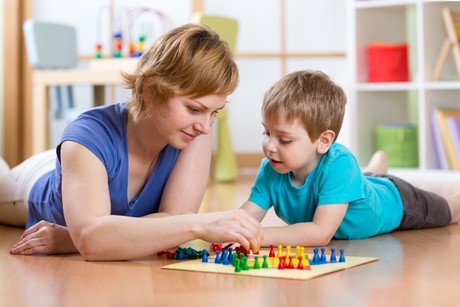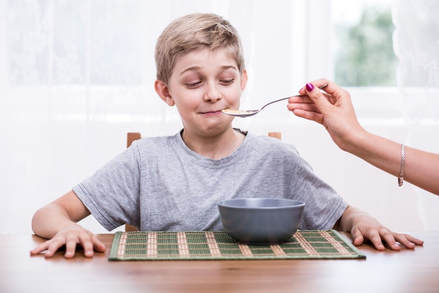 Easterseals’ work with children and families is often visible. After all, some of a child’s most obvious developments include how they progress from crawling to walking, how they learn to feed themselves, or how they learn to read. The list goes on. But, as most know, Easterseals services attend to the whole child – including his or her social development, emotional development and creativity. Thanks to a recently received financial contribution, Easterseals’ Early Childhood Education Center, Daytona Beach, soon will begin offering the “Create a Pal” program to its students, allowing teachers to help children better develop important social-emotional skill sets. Through Create a Pal, teachers will be able to create magical experiences for the children already enrolled, while allowing new students to Create a Pal (stuffed animal) when they enroll at the Center. The fuzzy friends they make with through their own creativity can comfort them while they’re at school and go back and forth from home to school with them every day as well. “Being able to tie in the creativity of making your own stuffed animal friend with our curriculum is amazing,” said Principal Margaret Smith. “We can use the Create a Pal machine to enhance everything we do, particularly when it comes to social-emotional learning.” “We’re grateful to the donor who made this program possible in our school,” said President/CEO Bev Johnson. “With Create a Pal, our teachers are able to provide yet another way to encourage children’s creativity and support them in their emotional development. Those are two features of our Early Childhood Education Centers that truly set them apart from other centers.” Teachers are being trained in how to bring Create a Pal to life and parents of students at the school soon will be able to register their children for the program. It’s only a matter of time before Easterseals’ Early Childhood Education Center is brimming with fuzzy friends and extra-wide smiles.  Easterseals' Dorothy Lefford is on a mission to remind adults why kids need more playtime. Easterseals' Dorothy Lefford is on a mission to remind adults why kids need more playtime. Children don’t play as much as they used to. Structured after-school activities have replaced spontaneous get-togethers with other kids in the neighborhood, while free-flow creative time has been replaced with scheduled activities. Being a kid today simply isn’t what it was 50 years ago, and for Dorothy Lefford, OTR/L, VP-Clinical Services with Easterseals Northeast Central Florida, lack of playtime is so much a concern that she’s actively working to change it in our communities. “We call the phenomenon ‘play deficit,’ and we see many consequences for not allowing children to use their imaginations and play freely within healthy parameters every day and for significant intervals” said Lefford. Play deficit has been studied extensively in recent years, and Lefford is an engaged champion dedicated to reversing the phenomenon. “Whenever I assess a child’s development, I consider how much play is incorporated into their lives and whether it’s an issue that needs to be addressed. We can learn a lot about a child from how much unstructured playtime they enjoy,” she said. Experts have documented the repercussions of play deficit for many years. They explain that lessened play time, notably since the 1950s, has contributed to increased mental disorders in children, higher instances of childhood anxiety and depression and increased suicide rates among older children and young adults. “Kids need a chance to be free and explore in safe environments that allow them to thrive,” said Lefford, who now speaks to local childhood development leaders about the seemingly unlimited benefits of childhood play. In her program, “Movement to Learn: The Brain/Body Connection,” Lefford trains professionals on the research behind movement and brain development, and its impact on performance in school and after-school programs. Further, she helps groups understand environmental factors impacting motor development and what the body needs to ultimately function. In each session, staff learn resources and strategies to implement stress management and movement into the classroom too, and in the case of the Boys & Girls Club of Volusia/Flagler Counties, how to implement play into after-school programs. “When children are playing, they are learning,” said Lefford. “They not only flex their imaginations, but also learn to cooperate, share, and how to be assertive without dominating. These are the kinds of social skills that serve us throughout our lifetimes.” Added Lefford: “Playing is too important to ignore. I’m proud to work with organizations that understands its value.” To learn more about and bring Easterseals’ “Movement to Learn” training program to your organization, call Dorothy Lefford at 386-944-7856.  Sickle Cell Disease affects one of every 500 African-American births and about one out of every 36,000 Hispanic-American births. Sickle Cell Disease affects one of every 500 African-American births and about one out of every 36,000 Hispanic-American births. Just last month, researchers published a study in the Pediatric Blood & Cancer academic journal about children’s perceptions of others’ understanding of their disability: Sickle Cell Disease. Among the findings, children with Sickle Cell Disease voiced concerns that their school teachers and administrators didn’t understand the disease very well and suggested the adults in their lives and had much room for improvement. Like any disability, Sickle Cell Disease is better understood with education. And, with that education comes empowerment. Sickle Cell Disease and Sickle Cell Trait are genetically inherited conditions that are passed down from parent to child. Sickle Cell Disease affects one of every 500 African-American births and about one out of every 36,000 Hispanic-American births. Individuals with Sickle Cell Disease are susceptible to complications such as a crisis (pain that can begin suddenly and last several hours to several days), infection, eye disease and/or stroke. Easterseals of Northeast Central Florida’s Sickle Cell Program provides case management services and education for residents of any age who have this form of anemia; residents who may be at risk for Sickle Cell Trait in Volusia County; or those who live, work or play with individuals with Sickle Cell. Easterseals offers residents and those diagnosed with Sickle Cell Disease educational sessions through its Sickle Cell Program to help them understand the implications of Sickle Cell Trait and how it may impact lifelong health and well-being. Individual case management, provided by a registered nurse, works to increase an individual’s (or their parent’s) understanding of the disease, too. This understanding leads to a healthier life and improved self-care. Community groups, health fairs, schools and other interested organizations are invited to receive Easterseals’ educational information about the Sickle Cell Program, which can include materials and/or presentations. Erika Wynn, a 2019 Honorary Ambassador with Easterseals’ Walk With Me spring fundraiser, is a local Sickle Cell Disease advocate who is actively involved in Easterseals’ Sickle Cell Program. Her experience with Sickle Cell has been supported by the Sickle Cell Program since she was a child. “Sickle Cell has been an experience, and sometimes it becomes a big fear in my life, but this support group is here to help us understand each other’s situations,” said Erika. “Every case of Sickle Cell is not the same…and having Sickle Cell is not about being sick. It’s about knowing how to deal with things. Said Erika: “I don’t want people’s sympathy, I just want them to understand.” To learn more about Easterseals of North Central Florida’s Sickle Cell Program case management or educational offerings, call 386-589-3892 or read more about them online.  Fueled by the mission of taking on disability together, Easterseals organizations around the world bring awareness, treatment and advocacy to adults and children with disabilities in America. The United States Government recognizes National Child Health Day every October 1 and stated in its 2018 Presidential Proclamation that “On Child Health Day, we renew our commitment to ensuring the health and well-being of our young people, who are the future of our great country. All children deserve to grow up in loving homes with parents or guardians who are dedicated to empowering them to live healthy, safe, and successful lives.” Easterseals is a partner in making this vision a reality and achieves it by creating and managing programs and services that make profound, positive differences in people’s lives every day. Easterseals of Northeast Central Florida’s services can be organized by how they fit into the “Live, Learn, Work, Play, Act” model: LIVE: These programs offer hands-on, comprehensive, vital services and support to help people reach their full potential—regardless of challenges, needs or disabilities. They include Agency for Persons with Disabilities - APD Application assistance, Autism Early Diagnostic and Functional Assessment Clinic, Feeding Aversion Clinic, Early Steps evaluation and treatment, an equipment loan program, Florida Telecommunications Relay, Inc., interpreter services, pediatric audiology, social skills training and more. LEARN: These programs are designed to help children and adults learn—and often re-learn— basic functions, master skills needed to develop and thrive, and be sharp and active as they age. They include American Sign Language® classes, case management/service coordination, Child Development Centers, Easterseals Charter School, Pre-Kindergarten, Evelyn Lynn Child Development Center at Project WARM, school-based therapy, Voluntary Pre-Kindergarten and more. WORK: These programs include a range of training, placement and related services that help people prepare for the workforce—because meaningful work is often the key to overcoming challenges and having a good life. Examples of Easterseals’ offerings include clinical training, Deaf advocacy, internships and physician in-services. PLAY: Easterseals is committed to offering fun, healthy programs for children, adults and caregivers to relax, connect with friends and engage in constructive activities—all necessary to living the best life possible. These programs and activities include accessible playgrounds, Camp Challenge, Joey’s Gift Respite Care, social skills training, and Tiny Toes Play Group for Early Steps. ACT: Easterseals is fortunate to have a vibrant community of friends and supporters who stand with those who face challenges by volunteering, advocating, donating and participating in events that inspire us all and sustain our cause. We encourage all citizens to get involved with Easterseals as an advocate, joining a board or committee, engaging in community collaboration, joining the Disability Coalition, contributing to the equipment loan closet, giving or donating funds, participating in special events and volunteering. To learn more about how to engage with Easterseals and learn more about its programs, connect by calling 386-255-4568, 1-877-255-4568 (toll-free) or 386-310-1157 (videophone); emailing [email protected]; or visiting us online at www.eastersealsnecfl.org.  The National Alliance for Caregiving reports that more than 43 million caregivers in the United States provide unpaid care to an adult or child annually. And, according to the National Respite Coalition Task Force, family caregivers are more than twice as likely than non-caregivers to report "usually or always" feeling stressed. If you’re a caregiver, maybe it’s time you took a healthy break. Easterseals of Northeast Central Florida wants to give you that gift of time. Joey’s Gift Respite, an Easterseals program, is designed to care for your child with special needs between the ages of 1-18. Joey’s Gift Respite offers four-hour breaks on designated Saturdays from 10 a.m. to 2 p.m. The next session will be October 20 at the Easterseals Child Development Center, 1219 Dunn Ave. in Daytona Beach. Trained staff and volunteers care for children in a safe and fun environment. Siblings are welcome, too. Plan to pack a lunch for all children attending, and if needed, include personal hygiene supplies or medications. Complete the enrollment form for Joey’s Gift Respite if it’s your first time attending. All caregivers must sign up online in advance or call Easterseals at 386-944-7816 at least five days before the scheduled program. Take a break, with confidence, with support from Joey’s Gift Respite. Take time to take care of you.  Easterseals of Northeast Central Florida’s Autism Center of Excellence has partnered with The PLAY Project™ to offer home-based consultations for families of children with autism. The PLAY Project, which represents “Play and Language for Autistic Youngsters,” is an evidence-based, parent-implemented and intensive early intervention program for young people with autism. The program is cost effective, easy to bring into a home setting and has proven results in improving the social challenges associated with autism spectrum disorder. The PLAY Project focuses on two key aspects to ensure greatest success: time intensity and the child’s age. Experts recommend 15-25 hours of engagement per week, and home consultants with Easterseals train the parents on what kinds of engagement are most beneficial. Starting early is equally important. Parents are encouraged to start The PLAY Project with their children before age five due to the significant brain growth experienced during that early life stage. To learn more about The PLAY Project, contact Easterseals’ Autism Center of Excellence at 386-944-7815 or email [email protected]. It’s time to play!  You've put butter on them, loaded them with cheese and buried them in macaroni noodles, but your child still won't eat what's for dinner. Or breakfast. Or lunch. If this sounds more familiar than foreign, you already know you have a picky eater on your hands. But did you know there’s treatment for it? That there’s a program available in our community that doesn’t incite tantrums by your child…or you? It’s called the TR-eat® Model (Transdisciplinary Effective Assessment and Treatment) and it’s now available through Easterseals of Northeast Central Florida. The TR-eat Model includes behavior strategies that are combined with skill building, facilitation, sensory desensitization, and oral motor intervention. Is this program for your child? Self-assess by answering the following: Does your child eat less than 15 foods consistently, maybe as few as 1-3? Does your child gag, shudder or vomit at the sight or taste of foods? Does your child become emotionally upset when they’re encouraged to interact with non-preferred foods? Are there large categories of foods your child refuses to eat? Does your child have sensory issues with food, such as not liking the way it smells, looks or feels? Contact Dorothy Lefford today at 386-944-7856 or [email protected] for more information on this evidence-based model that’s been found to have consistently positive results for picky eaters. Your child may not be ready for a salad bar, but enlisting Easterseals’ help with food aversion could be a sweet TR-eat. |
Details
Archives
May 2024
Categories
All
|

 RSS Feed
RSS Feed